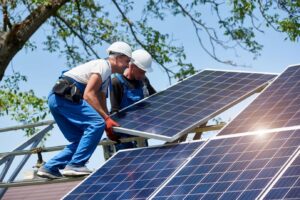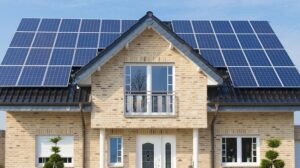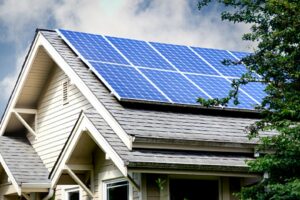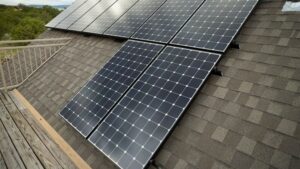There has been a great addition to the number of households using solar energy. It is a clean source of energy and helps to save money every month.
The main reason for installing solar panels for home is that it allows homeowners to generate their electricity power. To simplify, it reduces the dependency on private electric supply companies.
The thing about solar energy is that it may not work for everyone. For example, houses that don’t receive enough sunlight cannot use solar panels. That being said, let’s walk you through some important details about installing solar panels for your home.

Source: https://thearchitectsdiary.com/wp-content/uploads/2020/11/Installing-Solar-Panels-In-Your-Home-1.jpeg
Functioning of Solar Panel
It is mandatory to understand the functioning of solar panels for home before you decide to install them.
The photovoltaic cells in solar panels help in converting sunlight to electricity.
These photovoltaic cells absorb sunlight which powers up the electrons within the solar panel. This forms a direct current which is converted to alternating current by the solar inverter. That current is transferred to the connected electronic devices or sent back to the grid.
A Thorough Guide To Install Solar Panels
Getting a solar panel installed might seem a great deal of tasks, but after you understand the process, you will realise it isn’t that difficult. If you have decided to switch to solar energy, follow the installation steps below.

Source: https://s3media.angieslist.com/s3fs-public/beige-house-solar-panel.jpeg?impolicy=leadImage
Install The Mount
Start by installing the mounting brackets. There are two options – flush mounts or roof-ground mounts depending on the application.
The mounting system should be adjusted at an angle between 18 to 36 degrees.
Place The Solar Panels
After installing the mounting brackets, secure the solar panels to the structure. Make sure to tighten the nuts and bolts.
Get The Wiring Done
The next step is to complete the wiring for the panels to work. For connectors, you should use MC4 as it is compatible with almost all types of solar panels.
As for the electrical connection, you can either opt for a series connection or a parallel connection.
Connect The Solar Inverter
Once you are done with the wiring part, connect the solar inverter. Link the positive wire of the solar panel to the positive terminal of the inverter. Follow the same for the negative wire and terminal too.
Connect The Solar Inverter To The Grid
You have to link both the solar inverter and the power grid together. To establish the connection, use a standard plug.
Make sure that the electricity board is connected to an output wire.
Power On The Solar Inverter
After you are done with all the above steps, power on the solar inverter. You will see the statistics on the display screen.
That’s it. Your solar panels for home are successfully installed. Now you can generate energy from sunlight and save money on electricity bills.
Benefits Of Installing Solar Panels

Source: https://media.istockphoto.com/id/985363900/photo/solar-panels-on-roof-of-home.jpg?s=170667a&w=0&k=20&c=0QXu5kfEf76-jEGKnAB5PuYTcTKApWK_7KwljwgC1t8=
Using solar panels at home is associated with several benefits. Some of those benefits are:
Helps Save Money
This is the most obvious benefit of using residential solar power. Depending on private electricity companies can quickly spike up your monthly utility bills. The only money-saving alternative here is solar energy.
The size of the solar panel, the amount of power it generates, and the amount of electricity you consume will consider the money you will save. You can also save money by choosing a solar power system hosted by a third-party company and purchasing electricity on a budget.
Add Value To Your Home
Houses with solar panels tend to be more valuable than houses that don’t. It is seen as an important upgrade, just like a well-maintained basement, or renovated kitchen.
Homeowners across the state are willing to pay more prices for properties that have solar panels installed on the roof.
Freedom From The Grid
Another great advantage of using solar power is that it doesn’t depend on the grid. Residential solar panels are equipped with battery storage, enabling them to provide power even if the grid is down.
The battery system stores solar power and acts as a backup option. As a result, it can provide power regardless of the time of the day or weather conditions.
Common Mistakes To Avoid
Below is the rundown of the common mistakes which need to be avoided when installing solar panels.

Source: https://www.cnet.com/a/img/resize/94e400c70a7562a4024376e6a8e267afe9699eeb/hub/2021/05/14/eb7e153d-14e1-44c5-830a-29a40959e880/20150726-solar-panels-shankland-02.jpg?auto=webp&fit=crop&height=675&width=1200
Buying An Expensive System
Some of you might assume that an overpriced system will be more effective than a less expensive one. However, that’s not the case. There are different types of solar panels and they are all priced differently. Check out the different types before making a decision.
Not Measuring The Dimensions
It is important to determine the size of the system you need. Consider all the electrical devices you will use and add up the wattage. Also, calculate the duration per day that the appliances will be used.
Not Preparing A Checklist
Preparing a checklist of all the components helps to a great extent and you have a clear mindset on what to have. The list will include solar panels for home, a solar inverter, a battery, and a charge controller.
Care And Lifespan Of Solar Panels
Most solar panel systems last for 20-25 years, but the best part is that it is almost maintenance-free. To avail of the free maintenance, make sure to keep the system clean and remove obstructions like snow, leaves, or dirt.
The efficiency of solar panels reduces with time. The warranty ensures that the efficiency level won’t drop more than 2% in the first year. After the first year, the efficiency drops by 0.5% every year.
This means, your solar panels will be at a capacity of 84% after 24 years. But you also get models that offer a higher benchmark of 92% after 25 years.

Source: https://www.pv-magazine.com/wp-content/uploads/2021/09/36.72-kW-residential-solar-system-installation-by-Maxwatt-Solar-1536×1024-1-1200×800.jpg
Final Words
Switching to solar power can be a good decision, especially if you have too many electrical appliances to connect. It can help reduce the load and allow you to save more. Call for a professional consultation before the installation process. They can provide the assistance you need.

